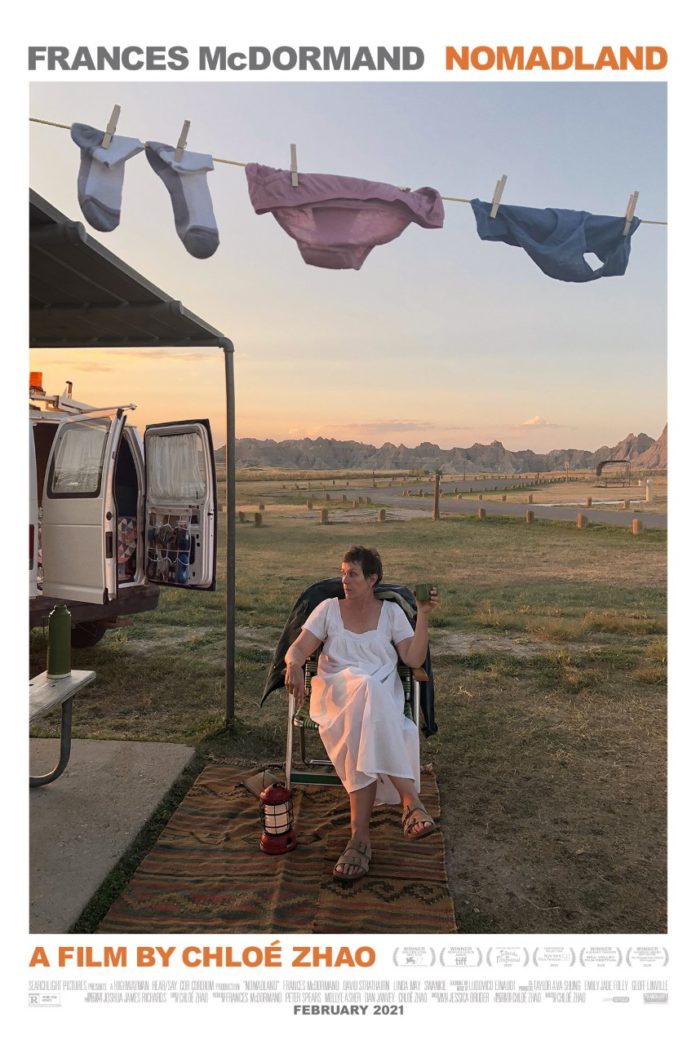It’s rare for a film to have all the right ingredients blend together so well that it nears a masterpiece. Chloé Zhao’s “Nomadland” is a film that was destined for greatness both for its ambitious creative decisions made on and off-screen. It’s a film that feels familiar in its themes, though is completely unique in the way Zhao captures the essence of life in America’s unfamiliar territories.
After the closure of a Sheetrock factory in early 2011, the city of Empire, Nevada is completely erased from existence. Ex-employees are left in the ruins of the once thriving town, held together solely by the mine that was affected by the economic crisis that swept had recently the nation. Fern, a recent widow and employee of the mine, begins the next phase of her life on the road. Packing all of her necessary and memorable belongings into a white van (which she names Vanguard), Fern travels the country in search of work and in hopes of finding herself along the way.
“I’m not homeless,” Fern tells a worried teenager she used to tutor early in the film, “I’m just houseless.”
Frances McDormand captures the heart and soul of a nomad. Playing Fern may have simultaneously been the most challenging yet relaxing part McDormand has ever taken on. Often a recluse to the media and the usual Hollywood spotlight, the two–time Oscar winner easily melts into the role of Fern, absorbing all of the raw, human qualities that go into a performance that feels documentary-esque.
There is a simple shot in the beginning of the film following Fern walking across an RV park. Her friends call her over to enjoy the warmth of the fire, yet she keeps walking. A light piano melody plays in the background and the audience feels every emotion hitting her. She is grieving her husband, attempting to come to terms with his loss, but she realizes there is so much beauty amongst the rusted RVs that surround her in this simple life. It’s a role only McDormand could take on.
This performance is elevated by a cast of real-life nomads. Zhao is a master at directing non-actors, allowing for these fascinating individuals to tell their own stories and explore their grief and experiences. She expertly incorporates these stories into her narrative, giving the film an extra sense of realism and more open, raw emotion.
One fascinating character is that of Bob Wells, who runs a YouTube channel discussing the nomadic lifestyle. In one of the film’s final scenes, Fern describes the death of her husband to Wells, who in turn begins to speak on a tragic moment that allowed him to appreciate his life as a nomad. It’s these passionate moments that showcase how every aspect of the film comes together wonderfully.
But everything would not come together so wonderfully had it not been the genius herself, Chloé Zhao. Zhao is able to expertly write, direct, and edit the film all herself. She is present in every aspect of this picture, making it a film that could not be tackled by any other filmmaker. While she has been in the indie scene her entire career, her next film is Marvel’s “Eternals” which will see her take her talents to a magnitude with one of the largest blockbusters to come this year. It’s no surprise why Marvel would want to work with this filmmaker as her already successful career continues to soar.
As award season (finally) begins, it’s no surprise that “Nomadland” is the leader of the pack. With a story that explores America and its citizens at its core, it’s easy for audiences to relate to and feel moved by this film. One of the most enduring aspects of the film is how open and honest it is, something many films today lack. A film like this being in the hands of the general public in theaters and (now) on Hulu allows for audiences to have a constructive conversation about what home means and how to deal with loss.
As Wells tells Fern in some of the best advice in the film, “I don’t ever say a final goodbye. I always just say, ‘I’ll see you down the road.’”









